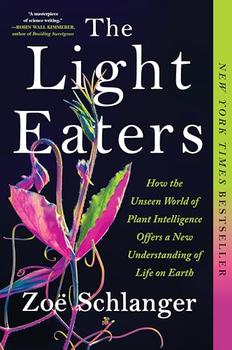Summary | Excerpt | Reviews | Beyond the Book | Readalikes | Genres & Themes | Author Bio

How the Unseen World of Plant Intelligence Offers a New Understanding of Life on Earth
by Zoë Schlanger
In the city, they seemed to make a home in the least suitable places. They burst from cracks in crumbling pavement. They climbed the chain link fence at the edges of garbage-strewn lots. I privately delighted as I watched a tree of heaven—loathed as an invasive species in the Northeast—emerge out of a split on my stoop and grow nearly to the size of a two-story building in a single season. Privately, because I knew this was seen as a hellish species in New York, in part because it injects poisons into the ground around its roots to prevent anything else from growing nearby, thereby securing its patch of sun; delighted, because this seems devilishly brilliant. When my neighbor cut the tree down with a machete late in the season, I understood. Still, I regarded its stump with admiration on my way out of the house every morning. It was already sprouting new green protrusions. You have to respect a good hustle.
So plants seemed like the right place to land my weary apocalyptic attention. Surely they would refresh me. But I soon learned they would do more than that. Plants have, over the course of years of obsession, transformed my understanding of what life means, and what its possibilities are. Now as I gaze around the Hoh Rain Forest I see more than a soothing wash of green. I see a masterclass in living to one's fullest, weirdest, most resourceful potential.
To start with, a life spent constantly growing yet rooted in a single spot comes with tremendous challenges. To meet them, plants have come up with some of the most creative methods for surviving of any living thing, us included. Many are so ingenious that they seem nearly impossible for an order of life we've mostly relegated to the margins of our own lives, the decoration that frames the theatrics of being an animal. Yet there they are all the same, these unbelievable abilities of plants, defying our anemic expectations. Their way of life is so astonishing, I will soon learn, that no one yet really knows the limits of what a plant can do. In fact, it seemed that no one quite knows what a plant really is.
This is of course a problem for the scientific field of botany. Or it's the most exciting thing to happen to it in a generation, depending on how comfortable you feel with seismic shifts in what you once thought to be true. Now I was hopelessly intrigued. Controversy in a scientific field tends to be a harbinger of something new, some new understanding of its subject. In this case, the subject was all of green life itself. I began to direct my growing interest entirely toward emerging thought in plant science. The more botanists uncovered the complexity of forms and behaviors of plants, the less the traditional assumptions about plant life seemed to apply. The scientific field was eating itself alive with contradictions, points of contention multiplying as fast as the mysteries. But something in me was attracted to this lack of neat answers, as I suspect many of us are. Who doesn't feel both drawn to and repulsed by the unknown?
This book will take up these new epiphanies in plant science, and the struggle along the way over how new scientific knowledge is made. Rarely does one get a glimpse of a field in true turmoil, debating the tenets of what it knows, about to birth a new conception of its subject. We will also consider a daring question currently being hotly debated in labs and academic journals: Are plants intelligent? Plants don't have brains, as far as anyone can tell. But, some posit, they should be considered intelligent regardless, based on the remarkable things they can do. We determine intelligence in ourselves and certain other species through inference—by observing how something behaves, not by looking for some physiological signal. If plants can do things we consider indications of intelligence in animals, this group says, then it's illogical, a sign of unreasonable zoocentric bias, not to use that language for them. Others go farther, suggesting that plants may be conscious. Consciousness is perhaps the least understood phenomenon in human beings, let alone other organisms. But a brain, this camp says, may be but one way to build a mind.
Excerpted from The Light Eaters by Zoë Schlanger. Copyright © 2024 by Zoë Schlanger. Excerpted by permission of Harper. All rights reserved. No part of this excerpt may be reproduced or reprinted without permission in writing from the publisher.
Your guide toexceptional books
BookBrowse seeks out and recommends the best in contemporary fiction and nonfiction—books that not only engage and entertain but also deepen our understanding of ourselves and the world around us.